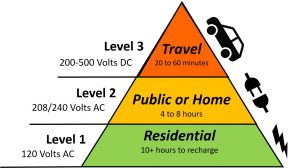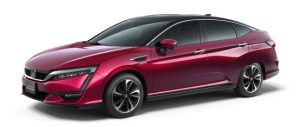Frequently Asked Questions About Electric Vehicles
Residential EV pages:
What is the difference between a conventional hybrid, a plug-in hybrid, and a battery electric vehicle?
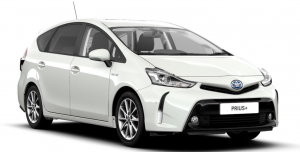
Conventional hybrids, such as the Toyota Prius, are primarily gas-powered cars that use electric motors to help out the internal combustion engine.
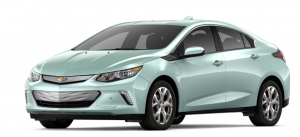
Plug-in hybrids (PHEV), such as the Chevrolet Volt, have a battery-powered electric motor that can function independently with enough range for a daily commute. They also have a conventional gas engine to extend the vehicle’s range.
Battery electric vehicles (BEV), such as the Nissan Leaf, are powered solely by a battery and electric motor.
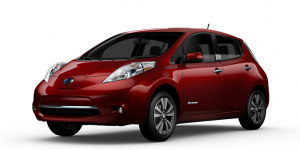
How far will an EV go on a charge?
Plug-in hybrids (PHEVs) like the Toyota Prius Prime, Chevy Volt, and Kia Niro can generally travel 20-50 miles on one charge. The combined gas and electric ranges of PHEVs are between 460-590 miles.
Battery electric vehicle (BEVs) like the Chevy Bolt, Nissan Leaf, and Honda Clarity can generally travel 80-240 miles on one charge.
What if I need to travel further?
- A) Plug-in- Hybrids (PHEVs) offer the green and fun driving experience of an EV on short trips with the convenience of extended range up to 400+ miles
- B) Power up your Battery Electric Vehicle (BEV) at a Level 3 DC fast charger to replenish range up to 70-80% in 30-60 minutes.
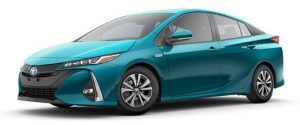
Toyota Prius Prime
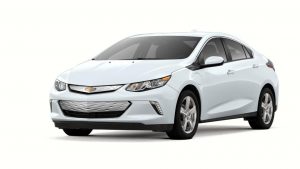
Chevy Volt
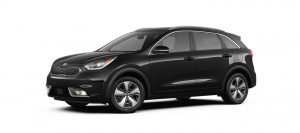
Kia Niro
How long do EV batteries last? Do they have warranties?
The usual battery replacement time is about 10 years. Battery replacement cost will depend on the size of the battery. Each manufacturer offers different battery warranties—for example, Nissan and Chevrolet offer an 8-year/100,000 mile warranty on their battery packs and Hyundai offers it for life. There will be some battery degradation over time that warranties do not cover.
How much does it cost to charge an EV?
RCEA’s network of charging stations are on a time-of-use pricing system. Charging costs $0.45 per KWh from 12am – 4pm, $0.50 per KWh from 4 – 9pm, and $0.45 per KWh from 9pm – 12am. Users will also be charged an additional overstay fee at select charing locations (both St. Joseph Hospital stations and C St.) of $1 per hour beginning one hour after charging is complete.
Other charging stations like those at casinos or hotels will have their own pricing schemes. Visit charging maps like Plugshare to see how much it will cost to charge at any nearby station. How long does it take to charge an EV?
Electric vehicles take 10+ hours to recharge on a Level 1 charger. Level 2 chargers can fully charge an electric vehicle in 4 to 8 hours. Level 3 chargers, also known as DC fast chargers, are most often used by people traveling long distances and can charge an electric vehicle in 20 to 60 minutes.
Charging Best Practice Tips (*)
- Limit DC fast charging. Repeated DC fast charging to the high end of state of charge (past 80% or so) may accelerate battery degradation. Try to use DC fast charging to reach a very high state of charge only if needed to reach a destination. (*)
- Charge small. Generally, many small charges are better for battery than a few larger charges. A deep discharge cycle constitutes a full chemical reversal inside the cell, whereas a shallow cycle is not a complete utilization of the chemical resources in the cell. (*)
- Assess when to charge your battery. Deciding whether to leave your battery always plugged in depends on the charging system and the EV model. Some recommend it, to keep the battery thermal management system functioning optimally. If you have time-of-use pricing from your utility, you may wish to schedule charging to take advantage of low rates. In extreme weather, you may also approach things differently. (*)
Should we leave the battery plugged in all day or only charge overnight? (*)
Leaving your battery always plugged in depends on the charging system and the EV model. Some recommend it, to keep the battery thermal management system functioning optimally. If you have time-of-use pricing from your utility, you may wish to schedule charging to take advantage of low rates. In extreme weather, you may also approach things differently.
How do you find EV charging stations?
There are a number of free public charging apps available that could help you find an EV Station.
Here are a few:
Chargepoint
Greenlots
Plugshare
Plug in America
Toyota
Tesla
Open charge map
Chargehub
What happens when your EV runs out of battery “juice”?
In some markets, AAA offers a mobile charging service from their trucks. In all other markets, you’ll need a tow or a push. Electric Vehicles need to be towed by a flat-bed tow truck.
Here are some local towing companies and their contact numbers:
- Humboldt Towing, 707-442-4537
- Pacific Towing, 707-443-8482
- Buddy’s Auto Center, 707-822-2615
How much does it cost to install a home charger?
If you want to charge an EV at home, you can actually do it without installing a home charger. Most EVs come with an adapter that allows you to plug into any 110V outlet.
It takes about 20 hours to go from completely empty to full using a 110V outlet, but if you are charging every night and have a relatively short commute it won’t take you that long to recharge your car every time.
If you have an older home, say older then 1970, you will likely want an electrician to visit your house to verify you have the electrical capacity to charge an EV.
Some folks want to charge at home at a faster rate. It is possible to install a Level 2 charger at your home. The costs vary, but here are some ball park estimates:
- To hire an electrician for the installation, you should expect to pay anywhere from $65-$85 and hour, for about $500 total. While you might be tempted to do this yourself, hiring a professional is the safest way to go.
- There are a wide array of EV charging station options available, but expect to pay between $500-$700. If you want a charger with higher power or longer cables expect to pay at the higher end of the range.
This brings the estimated total to $1200 to install a L2 charger at home.
What about the use of EVs as Home Battery for Solar Energy Storage? (*)
This is a technically feasible option for providing grid services or emergency backup power. More generally, timing EV charging to when a home or building’s solar panels are generating electricity is effectively a way to store that solar power for later use, even without the ability to return it from the vehicle to the home.
In most cases, with net metering, storage is not specifically needed to accommodate the levels of solar power currently on the electricity grid. But EVs could provide this capability if that changes. Vehicle-to-Home and Vehicle-to-Grid technology is still under development but will likely become commercially available within the next few years.
When can I purchase an EV with more cargo space?
Now! EV models on the market today have cargo space that is comparable with others in their class. There are hybrid minivans, SUVs, and trucks available from a variety of manufacturers and more are announced every year.
What kind of services do EV’s require?
Unlike conventional cars, in fully electric vehicles there are no oil changes, spark plugs, timing belts, fuel filters, head gaskets, radiators or fuel lines. The main wear items will be tires, brakes, windshield wipers, and the occasional cabin air filter- all relatively cheap in comparison!
What incentives are available?
RCEA is currently offering an EV home charger installation rebate.
View our Electric Vehicle Incentives Sheet (PDF) for more information about available federal, state, and utility incentives.
(*)= Information sourced from Plug In America.
What is a fuel cell electric vehicle (FCEV)?
An FCEV uses compressed hydrogen gas as its fuel, which is then fed into a fuel cell in the car to combine with oxygen to form water. This process generates electricity, which is harnessed to run a motor, and water vapor, which is the only emission from an FCEV.
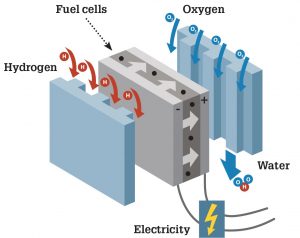
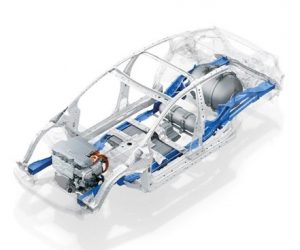
What are the advantages of FCEVs?
The state of California classifies FCEVs as “zero emission vehicles”. FCEVs are quiet and fuel efficient, just like EVs, however, they have much longer ranges (up to 360 miles!) and take only 3-5 minutes to refuel.
What FCEV models are available?
Toyota, Honda, and Hyundai all make fuel cell model passenger cars that are commercially available.


Where can I buy an FCEV?
You can only buy FCEVs in areas with hydrogen fueling stations. Currently, most fueling stations are in Los Angeles and the Bay Area. Fueling stations are coming soon to the New York City, Connecticut, and Boston areas as well.
Will there be hydrogen fueling stations in our region any time soon?
We hope so! In 2017 RCEA worked on a grant from the California Energy Commission to identify sites for hydrogen fueling stations along the Interstate 5 corridor. Redding and Eureka have been identified as priority sites for near-term station development.
How is hydrogen made?
There are a couple of ways. The first is through a process called electrolysis. This involves running an electric current through water to separate it into its components, hydrogen and oxygen. Clean power, such as solar energy, is frequently used to run this process. The other is called steam-methane reformation, which reacts steam with natural gas and a catalyst to make hydrogen. 33% of hydrogen used in CA is legally required to be produced from renewable resources.
How can I learn more about FCEVs and hydrogen?
There are lots of resources about hydrogen and FCEVs online, and a great place to start is with the statewide experts in FCEVs, the California Fuel Cell Partnership.
When hydrogen is produced via stream methane formation, what happens to the by products?
33% of hydrogen in California must be produced via renewable energy, but steam methane reformation is another common production method.
Steam methane reformation applies extreme heat to methane (CH4) to produce hydrogen via the following chemical reaction:
CH4 (methane) + H2O (water) <-> CO (carbon monoxide) +H2 (hydrogen)
Hydrogen is the obvious product we harness for FCEVs. The carbon monoxide is typically burned to extract extra energy and produces carbon dioxide upon combustion.
There are innovative carbon monoxide clean-up systems used in some factories which produce hydrogen but generally the CO ends up as CO2.
North Coast and Upstate Fuel Cell Vehicle Readiness Project
In March 2019, RCEA and SERC completed the North Coast and Upstate Fuel Cell Vehicle Readiness Project (PDF). This project supports the successful introduction of fuel cell vehicles throughout the eight-county North Coast and Upstate regions by catalyzing a regional fuel cell vehicle market and planning for the deployment of hydrogen fueling infrastructure.
Visit the RCEA Resources for Emergency Responder page for hydrogen and fuel cell resources related to safety and permitting.
Visit the RCEA Resources for Fleet Operators (PDF) to find resources related to incentives, available FCEV models, and training resources for fleet operators and managers. If you would like to receive a free fleet assessment to determine how much it would cost to incorporate a fuel cell electric vehicle, or other electric vehicle, into your fleet please call RCEA at 707-269-1700.
Installing a Home Charger
Autumn 2019 Newsletter – Installing a Home Charger
This newsletter provides a brief overview of frequently asked questions regarding installing a home EV charger, including who can install a charger, what permitting requirements are, and what type of charger one should install. The Owning a Charging Station page has more information.
Electric Bikes
Spring 2019 Newsletter (PDF) – Electric Bikes
Electric Bikes, or E-bikes, have a variety of benefits for riders of all ages. Read more about the types of e-bikes, what they can provide for riders, and how you may go about acquiring one. Our Electric Bikes and Rebate page has more information.
EV Frequently Asked Questions
Winter 2018 Newsletter – EV Frequently Asked Questions
If you are looking for information about electric vehicles, this newsletter provides details on plug-in hybrids, EV battery range, lesser known EV models and more. Read more information on our EV FAQ page.
EV Travel Tips
Autumn 2018 Newsletter – EV Travel Tips
This newsletter details some quick tricks to making longer road trips easier with an electric vehicle. Find more details about charging your EV in and out of the county on our Local Charging Stations page.
Meet a Local EV Driver
Spring 2018 Newsletter – Chargers, Incentives, and Interview with a Local EV Driver
This installment of the PEV newsletter includes information on DC fast chargers added to Humboldt County, incentives for EVs, and an interview with a local EV driver.
Archived Newsletters
These newsletters contain information that has been updated in more recent newsletters.
Past Presentations
RCEA Electric Vehicle Buying Presentations
August 26, 2020 Webinar with Lee Valenzuela, RCEA Transportation Specialist
RCEA Transportation Specialist Lee Valenzuela will talk about the different types of electric vehicles, financial incentives and assistance, consumer benefits, environmental benefits, fuel and maintenance savings, and charging options.
RCEA rolled out a local EV rebate in the Spring of 2020. Details were provided in the following webinar. It is important to note that this EV rebate program is no longer active. The program ran from April 15, 2021 to February 14, 2023. However, RCEA plans to issue information on a new EV rebate in 2024.
June 13, 2019 at the Eureka Chamber of Commerce with Aisha Cissna, RCEA Transportation Specialist



